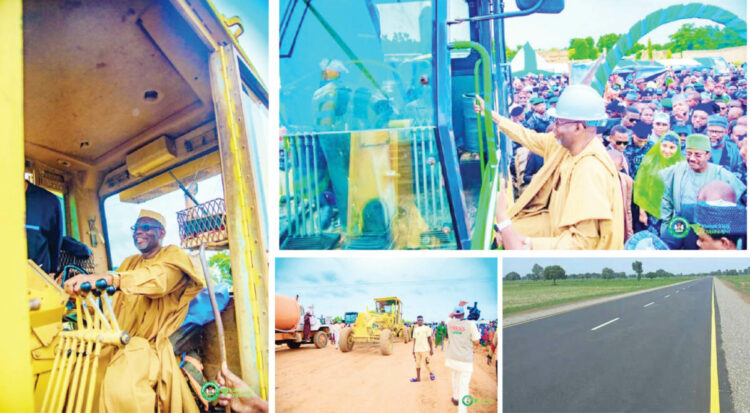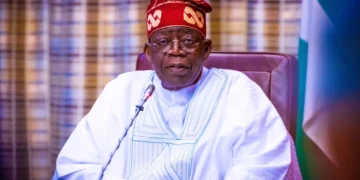Transportation is a key driver of social and economic development in human society. It facilitates the movement of goods and services from surplus to deficit areas.
Access roads are particularly significant in this process. They link rural areas to markets, connect industries to sources of raw materials, and ensure products reach the final consumer in good condition.
The importance of access roads is not limited to economics; they also provide people with access to essential public services, including education, healthcare, clean water, and other critical needs for a better life.
Recognising this importance in connecting rural areas to urban centres for the flow of goods and services, successive governments in Jigawa State have prioritised road construction—a legacy that the present governor, Malam Umar Namadi, has maintained and elevated to the next level.
Upon assuming office, Governor Namadi continued with all 26 inherited road projects. To date, 25 have been completed and commissioned, covering a total distance of 340 kilometres.
Today, Jigawa State is rated as having one of the best road networks in Nigeria. This has positively contributed to the state becoming a pivotal player in achieving national food security.
Furthermore, the existence of good access roads linking rural communities to healthcare services was undoubtedly a contributing factor in achieving a 25% reduction in the high rate of maternal and child mortality in the state, as reported by UNICEF in 2024.
Governor Namadi has since awarded 42 new road projects with a total distance of 976 kilometres across the state’s 27 local government areas.
The work is currently at various stages of progress. Upon completion, it will transform the lives of the beneficiary communities and enhance the state government’s ability to implement its 12-point agenda.
In one of his addresses, Governor Namadi explained that his administration accords special priority to road projects to ensure inclusiveness in governance and promote egalitarian development across the state.
He noted that his goal of transforming the state’s agricultural sector, which is the mainstay of its economy, cannot be achieved without good access roads that link rural farmers to markets for buying farm inputs and selling agricultural outputs.
“We will use available resources to enhance our critical public infrastructures, including roads, which also help us reach our people and deliver services at all times,” Governor Namadi said.
Last weekend, the governor also flagged off two additional road projects: the Gada—Farin Daba—Dandi Road, which spans 28.5km, and the Farun Daba—Maitsani—Ba’azuni—Kafin Chiroma—Gallo Babba—Gallo Karama Road, which spans 13.2km.
According to the state commissioner of works and transport, Engr. Gambo S. Malam, FNSE, the significance of these road projects cannot be overemphasised, as they represent a giant stride in infrastructural development and reflect one of the governor’s key 12-point agendas.
Engr. Gambo noted that Governor Namadi’s dedication to transforming the infrastructural development sector and ensuring citizens have the support they need to thrive is genuine and commendable.
“From the ministry’s side, we are working day and night to ensure contractors fully abide by the contractual agreement and deliver quality work. We have also hired consultants to help us adhere to due process and the procurement act for such projects,” the commissioner stated.
Some of the 25 inherited road projects completed by the Namadi administration include the dualisation of Fanisau to Unity Pentagon roundabout in Dutse capital, Gwaram to Warji Road in Gwaram local government, and the Auyo -Kafindare—Ayama Road in Auyo local government. Kargo-Kwanar Jigawa Danali Road in Babura local government.
Maigatari-Jabi- Kuka Nkuya- Dangwanki Road in Maigatari local government. Jahun-Gujungu Road, Yanleman-Kaugama – Kwanar Madana road in Kaugama local government, among others.
Other new road projects awarded by the Namadi administration, currently at various levels of completion, include:
Sundimina – Birnin Kudu Road, awarded at a cost of N11.5 billion. Sara – Gantsa Road, 47 kilometres in length, at N11 billion.
Bulangu, Gandun Sarki, and the Dutse capital, Chuwasu—Chakwaikwaiwa—Zangon Maje Road, Kankare-Kaljam-Duhuwa Road, Sada—Dankwar—Unguwar Malam Road, Gwabare-Kazura-Karanka Road, and township roads in Aujara, Bulangu, Gandun Sarki, and Dansure.
Firji- Gwata- Danabzin Road, Abus-Girbobo- Garin Bukar Road, Kwanar Danduna-Kada wawa- Kwanar Ola Yinka Road, among others.
Upon completion within the next year and a half, these road projects are expected to provide over one million people with better access to roads and connect over 500 communities.
These projects, which cut across all 27 local government areas, will go a long way in bridging the state’s infrastructure gap. They will also facilitate the delivery of other key government projects and programmes designed to make Jigawa State prosperous and great.
The widespread nature of these projects will attract investors to the state while sustaining its status as having one of the best road networks in Nigeria.
Most residents in the beneficiary communities of both completed and ongoing projects have described the work as a transformative intervention that will improve all aspects of their lives.
Many believe the road projects will help them improve their livelihoods and gain better access to public services.
Access to good roads is undoubtedly a key factor in supporting the well-being and economy of any society.
Governor Umar Namadi’s vision and mission for a greater Jigawa are on course, and the delivery of these projects is a commendable initiative.
The governor’s visionary leadership convinces every right-thinking person that democracy is truly working in Jigawa State.











